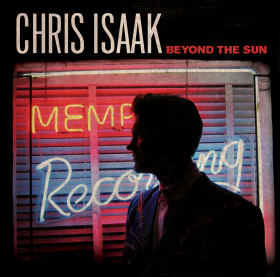Print Edition: November 2, 2011
 Chris Isaak is a modern representation of the classic rockabilly Americana sound. You’ve probably heard him; he’s had songs in movies such as Blue Velvet and Wild at Heart. He’s also played minor roles in movies and TV – Silence of the Lambs and Friends stand out as prime examples. More recently, though, he’s spent his time on his newest album, a tribute to his influences as a musician.
Chris Isaak is a modern representation of the classic rockabilly Americana sound. You’ve probably heard him; he’s had songs in movies such as Blue Velvet and Wild at Heart. He’s also played minor roles in movies and TV – Silence of the Lambs and Friends stand out as prime examples. More recently, though, he’s spent his time on his newest album, a tribute to his influences as a musician.
The album title seems to be a play on Bobby Darin’s ditty “Beyond the Sea.” The change to “Sun” most likely refers to Sun Records, the studio the album was recorded at – see what he did there? Clever. Sun Records has played host to many obscenely talented musicians, such as Johnny Cash, Roy Orbison, and the king himself – Elvis. In Isaak’s album, he pays tribute to these greats by recording new tracks of their hits.
Recording new tracks, however, is really just a nice way of saying that the album in its entirety is Isaak madly clinging to the coattails of his predecessors, vainly trying to grasp even a small portion of what made their songs so iconic. The first track, “Ring of Fire,” embodies this fairly succinctly. While the lyrics are the same, and the track is produced fairly competently, Isaak’s presentation of the song just doesn’t measure up. Though he is a musician of considerable talent, he spends the track trying—and failing—to sound like Cash. Had he simply tried to sing the song in his own style, perhaps it would have been more successful.
Though he fails to measure up on virtually every track, the very worst attempt is quite possibly “Great Balls of Fire.” The song is iconic – the name sparks instantaneous melodies in the mind of anyone who knows it – but Isaak just doesn’t deliver. He attempts, again, to emulate the original artist (Jerry Lee Lewis), but fails miserably. First, for some reason, the track was recorded at a slower tempo than the original. Perhaps this is in deference to Isaak’s age? At 55, his vocal chords likely aren’t what they once were. Whatever the reason, the classic rock piano line falls flat when it’s not up to speed. Perhaps the worst aspect of this butchering, though, is the iconic hook: while the original and its high yells of “great balls” delights karaoke singers everywhere, Isaak took the weak way out – he simply growls his way up to a lower note, possibly hoping no one will notice that the very best part of the original song has just been lost.
The closest attempt at a successful adaptation is probably “Can’t Help Falling in Love With You”. Maybe Isaak’s version doesn’t sound so horrible because this track has already been ripped off and re-recorded by everyone from Disney pop princesses to stoned princes of reggae. Purists will dislike Isaak’s version, simply because it is fairly close to (but not quite as good as) the original. However, while Elvis was an amazing artist, his voice isn’t universally appealing. Some may feel that Isaak’s inability to replicate Elvis’ gentle warble actually improves the track.
While Isaak’s album is an assault on the ears of people who love the most classic of classic rock, it has some upsides. Even though his voice doesn’t match the seasoned ear’s high expectations, the double album does provide listeners with a good compilation of some great songs. Further, there hasn’t been any noticeable attempt to modernize the tracks: the main guitar lines of each song come from Isaak’s own Gibson guitars, and the engineering process didn’t remove any of the twang that has become a hallmark on these classic tracks. While it’s not a great example of creative musicianship, and not Isaak’s greatest work, if you like the genre it might be worth a listen.

